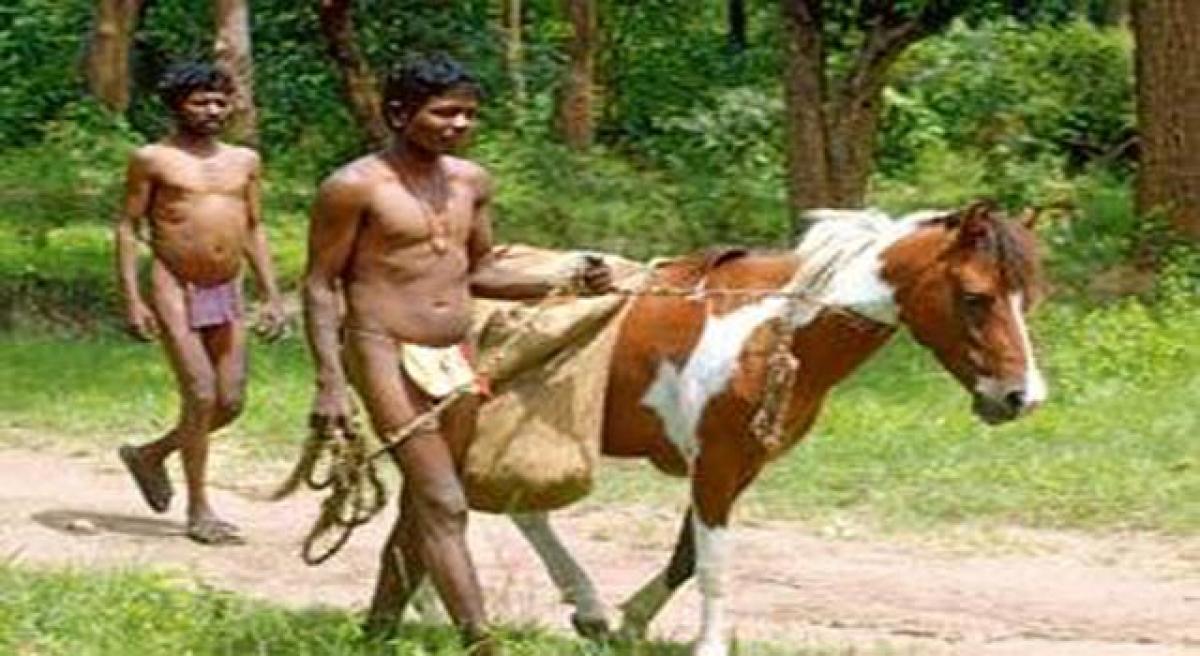Live
- Chandrababu Advocates Strict Measures for Social Welfare and Infrastructure Development in AP
- Show of brotherhood by Vijayan, Stalin at event to honour Dravidian icon
- District Collectors’ conference with CM begins
- Celebrations kick off in Saudi Arabia to welcome FIFA World Cup 2034
- Google Unveils Jules AI to Help Developers Fix Code Errors
- Bengaluru Techie’s Tragic Suicide Sparks Outrage Over Family Disputes and Legal Failures
- Crucial Union Cabinet meeting to discuss One Nation One Election
- Irrigation AE Nikhesh Kumar Arrested in Disproportionate Assets Case, Granted 4-Day Custody
- Your Daily Horoscope for December 12, 2024: Unlocking Mysteries of the Stars
- Hyderabad: 18-Month-Old Girl Dies After Being Hit by Car in Jawaharnagar
Just In

Indian officials have been slow to implement a landmark law giving rights to forests to indigenous people because they view it as a handicap to development projects spurring expansion in the fast-growing economy, a land rights campaigner said.
Mumbai : Indian officials have been slow to implement a landmark law giving rights to forests to indigenous people because they view it as a handicap to development projects spurring expansion in the fast-growing economy, a land rights campaigner said. The 2006 Forest Rights Act aims to improve the lives of impoverished tribes by recognising their right to inhabit and live off forests where their forefathers settled.
Under the law, at least 150 million people could have their rights recognised to a minimum of 40 million hectares (154,400 sq miles) of forest land, the Rights and Resources Initiative (RRI) estimated. But the group, which promotes access to land and natural resources, says barely 1.2 per cent of the area has been recorded in the last decade. "There is a genuine misunderstanding among the political class that if you grant rights, it will be against development," said Arvind Khare, an executive director at RRI in New Delhi.
"There is fierce competition among the states for investment in infrastructure and mining. The law is seen as an impediment to this," he told the Thomson Reuters Foundation. Indigenous people hold legal titles to only about 5 percent of the land they have lived on. By recognising community forest rights and resource rights, the Forest Rights Act could transform forest governance and rural livelihoods, paving the way for the "largest land reform ever" in India, RRI said last year.
Yet few states have implemented the law fully, and more than half of all claims for titles have been rejected, according to recent data from the Ministry of Tribal Affairs. Eleven of India's 29 states did not award any titles in the past year. The law gives village councils the right to approve projects that require forest land to be cleared. This has pitted states keen on development against indigenous people who say their livelihoods are threatened. "There is very little awareness of the law amongst people, and most claims are rejected on very flimsy grounds," Khare said.
"But allocating land to industry without settling rights will backfire," he said. Conflict over land rights has increased in India as land is sought for industrial use and development projects in one of the world's fastest growing economies. Forest land is primarily located in the country's poorest areas, including some that are racked by extremist violence. Four people were killed at the weekend when police opened fire on villagers protesting the takeover of their land for a coal mine in the eastern state of Jharkhand.
The state had earlier approved amendments to two laws to enable the acquisition of tribal land for commercial use. Government authorities are ignoring evidence that use of forests by local communities can enhance food and livelihood security, and that recognition of community forest rights can lead to development in tribal and forest areas, Khare said.
Thanks largely to the efforts of a handful of states including Odisha, Chattisgarh, Gujarat and Maharashtra, more than 0.5 million hectares of forest land could be recognised this year, Khare estimates. "But by and large, there is little pressure on the states to recognise forest rights. So we will continue to see big struggles, big conflicts over our forest lands," he said.
By Rina Chandran

© 2024 Hyderabad Media House Limited/The Hans India. All rights reserved. Powered by hocalwire.com







